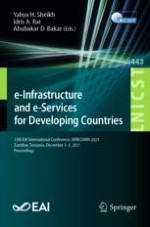2022 | OriginalPaper | Chapter
Barriers and Facilitators of eHealth Adoption Among Healthcare Providers in Uganda – A Quantitative Study
Authors : Hasifah K. Namatovu, Agnes R. Semwanga, Vincent M. Kiberu, Livingstone Ndigezza, Mark A. Magumba, Swaib K. Kyanda
Published in: e-Infrastructure and e-Services for Developing Countries
Publisher: Springer International Publishing
Activate our intelligent search to find suitable subject content or patents.
Select sections of text to find matching patents with Artificial Intelligence. powered by
Select sections of text to find additional relevant content using AI-assisted search. powered by
